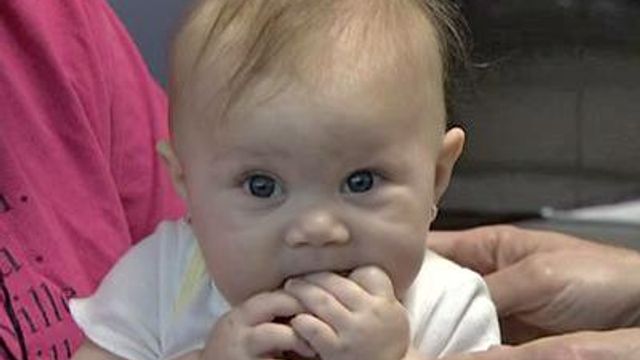Being a 'green' mom won't break the bank
Environmentalists say raising a baby doesn't have to put a strain on the planet or your budget.
Posted — Updated"We buy everything second-hand, pretty much. That eliminates a lot of waste, because babies go through clothes and toys so quickly,” Raleigh mother Monica Gaertner said.
Shopping second-hand, breast feeding and using cloth diapers were among the many "green" decisions the Gaertners made when baby Owen was born. They also chose to use organic cleaners and detergents, and turn locally-bought fruits and vegetables into baby food.
"You just puree them in a blender and freeze them,” Gaertner said.
Gaertner says her green choices are good for the environment and her budget.
"Parents have a lot more choices than they had years ago,” said Dr. Tom Flaherty, with Rex Pediatrics of Cary.
Flaherty says it is easy for parents to make environmentally-friendly decisions that can also benefit a child's health. He also says a pediatrician can help you sort facts from green-living hype.
"I think parents have to weigh the science and make informed decisions,” Flaherty said.
The Gaertners say their little changes add up to make a big difference in their life. They hope others will do the same.
"You're making these small changes, but you hope that enough people are making small changes to create a significant change in the environment,” Gaertner said.
One of the big environmental issues worrying parents is Bisphenol A (BPA), a chemical found in hard plastic food containers, including baby bottles.
Some scientists' worry that long-term exposure to BPA can alter cells and lead to health problems, including cancer, obesity and diabetes.
Some states are considering bans on BPA, and at least six companies say they will stop using BPA to manufacture baby bottles.
- Don't microwave polycarbonate plastic food containers. Polycarbonate is strong and durable, but over time it may break down from over use at high temperatures.
- Polycarbonate containers that contain BPA usually have #7 printed on the bottom.
- Reduce your use of canned foods.
- When possible, opt for glass, porcelain or stainless steel containers, particularly for hot food or liquids.
- Use baby bottles that are BPA free.
• Credits
Copyright 2024 by Capitol Broadcasting Company. All rights reserved. This material may not be published, broadcast, rewritten or redistributed.






